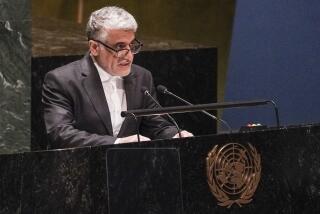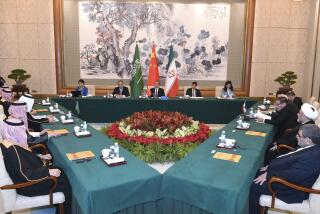On Iran, Obama’s U.N. speech could be a game-changer
If the new diplomatic initiative now endorsed by both President Obama and new Iranian President Hassan Rouhani leads to formal talks -- and potentially even a deal on Iran’s nuclear program -- Obama’s speech Tuesday could well prove to be his most important U.N. address and one of the most important foreign policy speeches of his presidency.
The speech represented the most serious U.S. public outreach to resolve disputes with Iran since the 1979 revolution. It was a particularly stark contrast with the secret (and disastrous) arms-for-hostage swap under the Reagan administration in the mid-1980s.
Obama clearly sought balance. His overture acknowledged past American attempts to manipulate Iranian politics, notably the CIA-orchestrated coup against a democratically elected government in 1953. Now, he said, Washington is not out to change the regime in Tehran.
But Obama also pointed out the many transgressions by the revolutionary regime, including seizing the U.S. Embassy in 1979 and backing extremist movements that have targeted many Americans.
By empowering Secretary of State John F. Kerry to deal directly with Tehran -- in collaboration with five other major powers -- Obama took a vitally important step in testing whether Rouhani has the will and ability to solve the crisis over Iran’s nuclear program.
So it could be a game-changer.
Robin Wright is a joint scholar at the U.S. Institute of Peace and the Woodrow Wilson Center. She most recently wrote “The risk of taking on Syria” for our Op-Ed pages and contributed to the Opinion L.A. blog: “Will U.S.-Russia deal change battlefield realities in Syria?”
More to Read
A cure for the common opinion
Get thought-provoking perspectives with our weekly newsletter.
You may occasionally receive promotional content from the Los Angeles Times.






